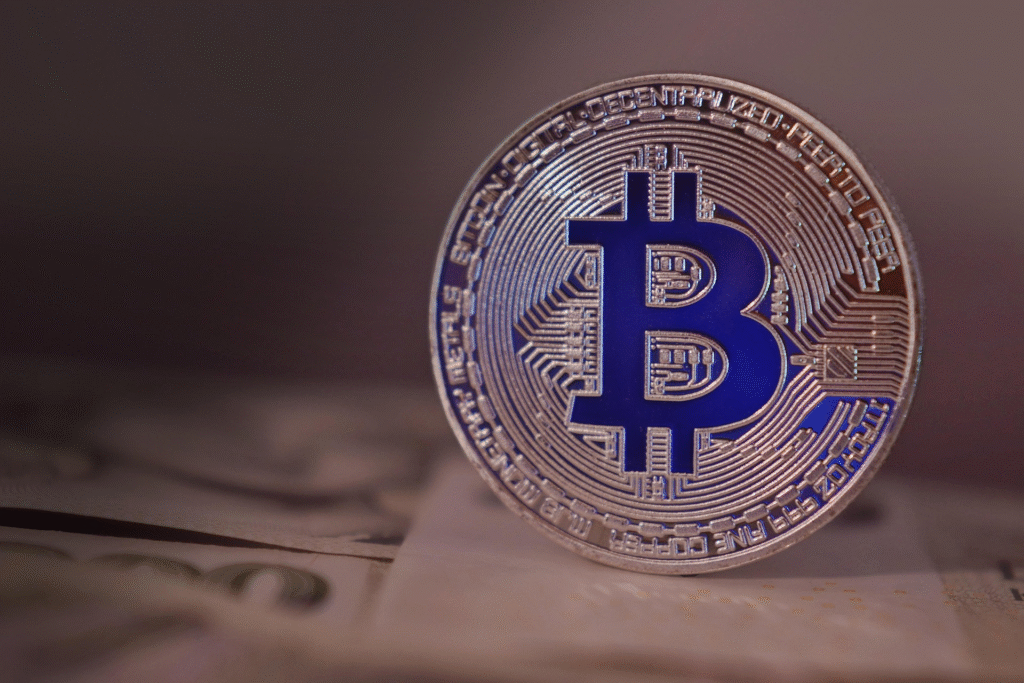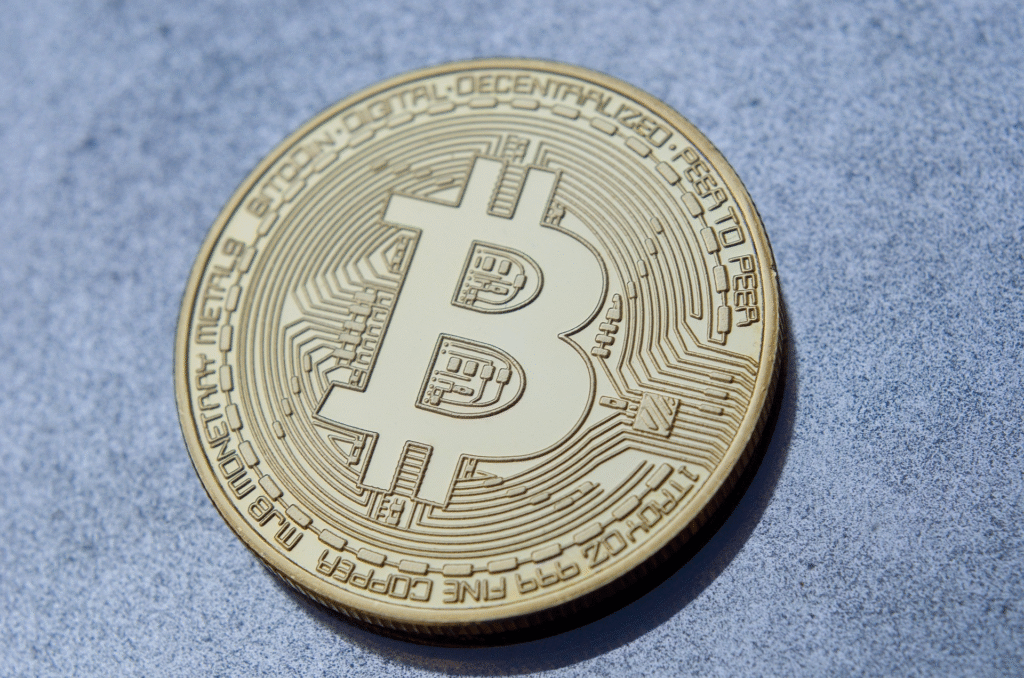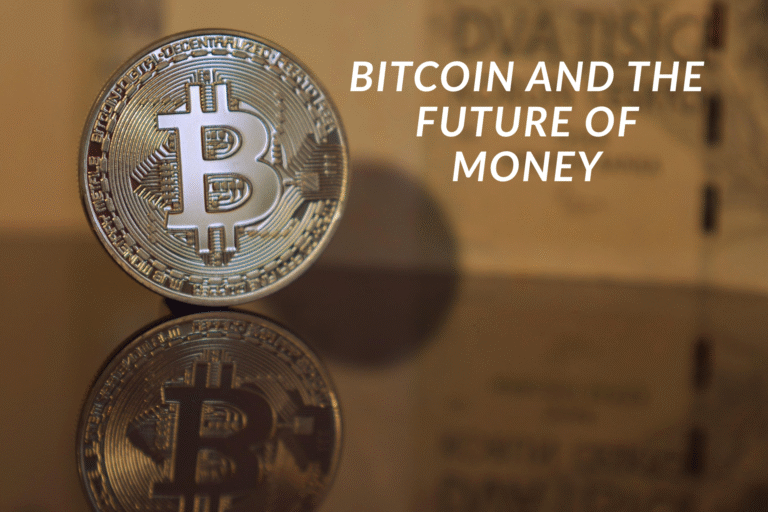Bitcoin and the Future of Money: The first decentralized digital currency in history, Bitcoin, is completely changing the way we think about money. Founded in 2009, it operates independently of governments and banks, utilizing blockchain technology to ensure security, trust, and transparency. With inflation threatening fiat currencies and existing banking systems coming under increasing scrutiny, Bitcoin provides a decentralized, scarcity-based alternative.
Bitcoin and the Future of Money: Its emergence has spurred discussions throughout the world about whether it can actually replace cash or if it will continue to be a specialized asset. This investigation explores how Bitcoin affects the monetary system and how it can influence how we store, exchange, and value in the future.
Bitcoin and the Future of Money.

Bitcoin and the Future of Money: Bitcoin has gone from being a tiny experiment to a worldwide phenomenon in just over ten years. That was created in 2009 under the pseudonym Satoshi Nakamoto. It was intended to be a peer-to-peer, decentralized digital currency that could operate independently of reputable middlemen or central banks. One question is still crucial as organizations, governments, and people consider its ramifications: Is Bitcoin the currency of the future?
The Evolution of Money.
Understanding the history of money is crucial to appreciating Bitcoin’s potential. Barter systems, commodity money (such as gold and silver), paper currencies, and the digital banknotes and electronic transactions of today are just a few of the different forms of money that have existed throughout history. Fundamentally, money has three purposes: it is a store of value, a unit of account, and a medium of exchange.
The U.S. dollar and the euro are examples of modern fiat currencies that are issued by governments and supported by trust rather than tangible goods. Despite their widespread use and stability, they are nonetheless vulnerable to central control, inflation, and political manipulation. By providing a different system based on encryption, decentralization, and mathematical scarcity, Bitcoin challenges this paradigm.
What Makes Bitcoin Different?
Blockchain technology, a decentralized ledger kept up to date by a global network of computers (nodes), is the engine behind Bitcoin. This public ledger records each transaction, which miners verify using a procedure known as proof-of-work. Bitcoin is not governed by a single entity, in contrast to traditional banking. This provides it with a number of distinguishing features.
(1) Decentralization.
No single entity or government controls Bitcoin. This reduces the risks of censorship, inflationary policies, and manipulation.
(2) Limited Supply.
Bitcoin is capped at 21 million coins, a feature hardcoded into its protocol. This makes it inherently deflationary, unlike fiat currencies that can be printed endlessly.
(3) Transparency and Immutability.
All transactions are recorded publicly and cannot be changed. This builds trust and reduces fraud.
(4) Borderless and Inclusive.
Bitcoin can be sent or received anywhere in the world, offering financial access to the unbanked and underbanked populations.
Bitcoin as a Store of Value.
Like digital gold, many proponents of Bitcoin contend that its most promising use is as a store of value. Bitcoin is sometimes viewed as a hedge against inflation and currency devaluation, especially in nations with shaky economies, due to its fixed supply and increasing scarcity (caused by events known as “halvings”).
The addition of Bitcoin to the balance sheets of institutional investors, such as businesses like Tesla, MicroStrategy, and investment firms like Grayscale, indicates a change in perspective from speculative asset to strategic reserve.
Bitcoin as a Medium of Exchange.

Despite its strengths as a store of value, Bitcoin’s role as a medium of exchange remains debated. Critics argue that:
- Transaction speeds and fees can be high, especially during network congestion.
- Price volatility makes it impractical for everyday use.
- Limited merchant adoption prevents it from being a widely accepted payment method.
The Lightning Network, a second-layer protocol that facilitates quicker and less expensive Bitcoin transactions, is one approach that attempts to address these problems. Some nations, such as El Salvador, have even made Bitcoin legal tender and are testing out Bitcoin-based national payments.
Challenges and Criticisms.
Despite its potential, Bitcoin faces significant hurdles:
(1) Volatility.
Bitcoin’s price is notoriously volatile, rising and falling rapidly based on news, sentiment, and macroeconomic trends. This undermines its utility as a stable unit of account.
(2) Regulatory Uncertainty.
Governments and regulators are still determining how to treat Bitcoin. While some embrace it, others restrict or ban it altogether due to concerns about money laundering, tax evasion, and financial stability.
(3) Environmental Concerns.
The environmental impact of bitcoin mining has been criticized because to its high electricity consumption. Nonetheless, a lot of miners are switching to renewable energy, and more environmentally friendly models are provided by other consensus techniques (like as Ethereum’s proof-of-stake).
(4) Security and Custody.
While the Bitcoin network itself is highly secure, users must take precautions with wallets and private keys. Hacks, scams, and lost passwords remain common problems.
The Broader Impact on the Financial System.
Bitcoin’s rise has already had profound ripple effects across the financial world:
● Central Bank Digital Currencies (CBDCs).
Governments worldwide are exploring or launching digital versions of their national currencies, inspired in part by Bitcoin’s success. Unlike Bitcoin, however, CBDCs are centralized and controlled by the state.
● Financial Inclusion.
With just a smartphone, anyone can access Bitcoin. This could be transformative for the 1.7 billion people globally who lack access to traditional banking services.
● Redefining Trust.
Bitcoin replaces the need for institutional trust with trust in code, mathematics, and consensus. This challenges traditional roles of banks, payment processors, and even governments in the monetary system.
Will Bitcoin Replace Traditional Money?
The idea that Bitcoin will fully replace fiat currencies is still speculative. More likely, Bitcoin will coexist alongside other forms of money, serving specific purposes:
- As a store of value, it may rival gold.
- As a hedge against inflation, it may protect wealth in uncertain times.
- As a digital payment system, it may support cross-border transactions where fiat systems fail.
Bitcoin may not replace money as we know it, but it is undoubtedly reshaping our understanding of what money can be.
Conclusion.
Bitcoin represents a fundamental change in the way we see money, value, and trust; it is more than just a digital asset. Bitcoin may become more significant in a financial future that is more decentralized, transparent, and inclusive as technology advances and adoption rises.
Although there are many obstacles along the way, including social, legal, and technical ones, the groundwork has been established. Bitcoin’s influence on the future of money is already evident, regardless of whether it takes over as the primary global currency or merely plays a crucial role in a more varied monetary environment.

